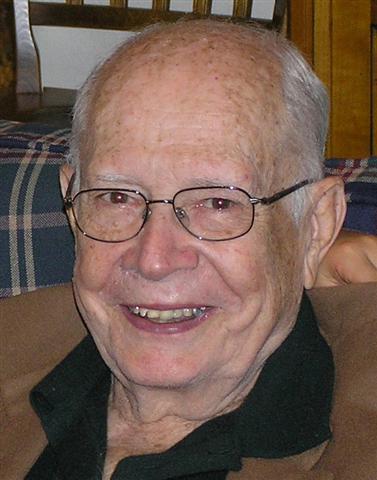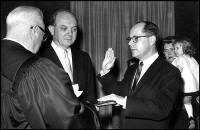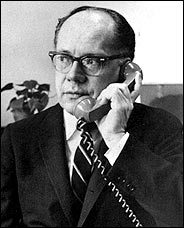OBITUARIES
 Fred
Dutton, 82; Key Aide to Kennedys and Gov. Pat Brown
Fred
Dutton, 82; Key Aide to Kennedys and Gov. Pat Brown
By Myrna Oliver
Times Staff Writer
June 27, 2005
Fred Dutton, a Democratic power broker in both Washington and California who
served as assistant to President John F. Kennedy and chief of staff for Gov.
Edmund G. "Pat" Brown, has died. He was 82.
Dutton died Saturday at George Washington University Hospital in the
nation's capital of complications from a stroke.
Known for his pixie-like demeanor and easy rapport with everybody, including
politicians, members of the news media, business executives and student
demonstrators, Dutton moved

easily on the world stage. Since 1975 he had been Washington counsel and
lobbyist for Saudi Arabia. In that role he was generally credited for
maneuvering through Congress the approval of major arms sales to the kingdom
in 1978 and 1981.
An influential intellectual who could impishly throw a gleeful "hee-hee-hee"
into conversations or national interviews, Dutton wrote two books on
national politics: "Changing Sources of Power: American Politics in the
1970s," published in 1971, and "Election Guide for 1972" in 1972. He also
contributed frequent Op-Ed articles to The Times and other newspapers and
was paired for some months with Ronald Reagan's campaign chief John Sears on
PBS' "MacNeil/Lehrer NewsHour."
After campaigning for Kennedy, Dutton moved to Washington in 1961 as his
assistant for interdepartmental and intergovernmental affairs and secretary
of the Cabinet. He later transferred to the State Department as assistant
secretary for congressional affairs.
"The relationship of government to the chief executive, whether it is the
president or a governor, is somewhat similar," he told The Times as he eased
from state to national problem-solving more than four decades ago. But "the
governor of California has more space — and it is more efficiently organized
— than the president. I don't think anyone outside knows how small the White
House office is."
When Kennedy was slain, Dutton was tapped as coordinator of the John F.
Kennedy Library, where he organized the Kennedy Oral History Project. Loyal
to the Democratic party as well as the Kennedy family, Dutton took charge of
the platform committee for the 1964 convention and wrote speeches for Lyndon
B. Johnson's campaign.
When Robert F. Kennedy ran for president in 1968, Dutton served as
behind-the-scenes campaign manager. He was with the candidate when he was
slain at Los Angeles' Ambassador Hotel, and rode with Kennedy and his wife,
Ethel, in the ambulance to the hospital. Later, Dutton served as founding
director of the Robert F. Kennedy Memorial Foundation.

He
also served on the Democratic National Committee's McGovern Commission from
1969 to 1972 to revamp the convention delegate selection process. His effort
to include more women prompted feminist Betty Friedan to dub him "the Papa
Bear of the women's liberation movement."
Dutton also worked on the presidential campaigns of Hubert H. Humphrey in
1968 and George McGovern in 1972, but did so reluctantly.
"After Bobby was shot, the lights went out for me," he told The Times in
1981. "I've never really been as involved in presidential politics again as
I was then."
The disillusionment helped explain to many why the unabashedly liberal
Dutton, who established his Washington law firm in 1965, later agreed to
represent the conservative Saudi Arabian government. He became so skillful
at negotiating for and with the Saudi royals that one opposing Washington
lobbyist dubbed him "Fred of Arabia," alluding to Britain's Lawrence of
Arabia.
Dutton's efforts to engineer the sale of defense equipment in 1981 even
placed him on the same side as conservative President Reagan, little more
than a decade after the two men had clashed when both sat on the UC Board of
Regents.
It was Dutton who coined the slogan "Reagan or Begin" — referring to
then-Prime Minister Menachem Begin of Israel — to promote the sale of
Airborne Warning and Control System (AWACS) planes to Saudi Arabia, a
transaction that many American Jews saw as a slap at U.S. alliances with
Israel.

"I enjoy the intellectual vicariousness of it. They are obviously paying me
very well," he told The Times in 1981, explaining his acceptance of the job
requiring him to do such varied tasks as lobbying Congress to ship recliners
to the Saudi king and defending Saudi students in auto accidents. "And I'm
back in politics without it being at the personal level. I'm not back with
Bob Kennedy in the hallway of the Ambassador Hotel. I like the fight…. I
think international policy is important."
Long before Dutton became a player in national and international politics,
he had ensconced himself in California's halls of power.
Born Frederick Gary Dutton on June 16, 1923, in Julesburg, Colo., Dutton
moved to San Mateo, Calif., with his parents when he was 7.
He served in the Army during World War II and became a prisoner of war after
he was wounded in the Battle of the Bulge, earning a Purple Heart and a
Bronze Star.
After completing his bachelor's degree with honors at UC Berkeley, he earned
a law degree at Stanford, where he was on the first editorial board of its
law review, along with Warren M. Christopher, future secretary of State in
the Clinton administration, and Shirley M. Hufstedler, who would serve as
secretary of Education for President Carter.
Dutton began his private law practice in San Mateo, and after serving in the
judge advocate general's corps during the Korean War, became chief counsel
for what was then the South Counties Gas Co. in Los Angeles.
The energetic attorney cut his political teeth running the Southern
California presidential campaign for Adlai Stevenson in 1956. That year he
also linked up with Brown as the future governor's chief assistant in the
state attorney general's office.
As Brown's campaign manager in 1958, Dutton succeeded in bringing the first
Democrat to the governor's chair in the 20th century. A grateful Brown made
him chief of staff, where Dutton helped push the landmark California Water
Project through the Legislature.
The two men remained close even after Dutton left to join the Kennedy
campaign in 1960, and Brown appointed him to the UC board, where he served
from 1962 until resigning in 1976. As a regent, Dutton championed student
protesters in the free-speech movement at Berkeley's People's Park and
anti-Vietnam War demonstrations.
Dutton clashed frequently with Reagan, who unlike other California governors
took his automatic seat on the board seriously and attended meetings. Dutton
and Reagan traded barbs over many issues, including Reagan's 1970 imposition
of tuition, accusations that each politicized the board and Dutton's
assertion that UC was a racist institution.
Reagan was so provoked at one 1970 regents meeting in San Francisco that he
shook his finger at Dutton and called him a liar.
Dutton is survived by his wife and law partner, Nancy; their two children,
Stacy Dutton of Philadelphia and Christina Dutton of Washington, D.C.; three
children from his first marriage to June Kingborg, Christopher Dutton of San
Anselmo, Calif., Lisa Dutton and Eve Dutton of San Carlos,
Calif.; and seven grandchildren.
Plans for funeral services and burial in Arlington National Cemetery are
pending.
![]()
 Fred
Dutton, 82; Key Aide to Kennedys and Gov. Pat Brown
Fred
Dutton, 82; Key Aide to Kennedys and Gov. Pat Brown easily on the world stage. Since 1975 he had been Washington counsel and
lobbyist for Saudi Arabia. In that role he was generally credited for
maneuvering through Congress the approval of major arms sales to the kingdom
in 1978 and 1981.
easily on the world stage. Since 1975 he had been Washington counsel and
lobbyist for Saudi Arabia. In that role he was generally credited for
maneuvering through Congress the approval of major arms sales to the kingdom
in 1978 and 1981. He
also served on the Democratic National Committee's McGovern Commission from
1969 to 1972 to revamp the convention delegate selection process. His effort
to include more women prompted feminist Betty Friedan to dub him "the Papa
Bear of the women's liberation movement."
He
also served on the Democratic National Committee's McGovern Commission from
1969 to 1972 to revamp the convention delegate selection process. His effort
to include more women prompted feminist Betty Friedan to dub him "the Papa
Bear of the women's liberation movement."